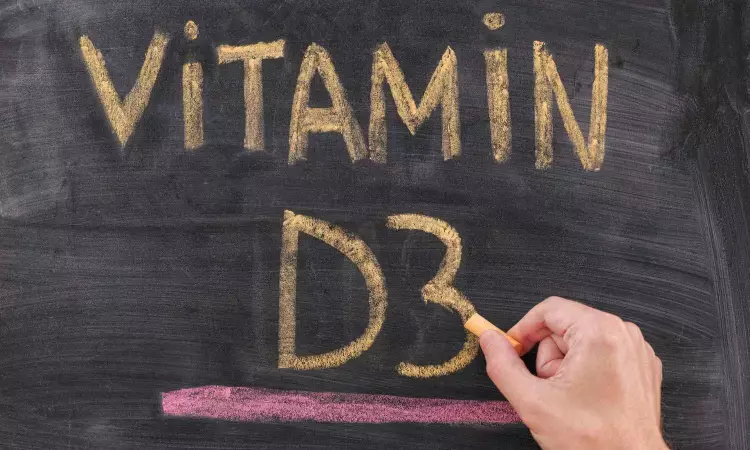- Home
- Medical news & Guidelines
- Anesthesiology
- Cardiology and CTVS
- Critical Care
- Dentistry
- Dermatology
- Diabetes and Endocrinology
- ENT
- Gastroenterology
- Medicine
- Nephrology
- Neurology
- Obstretics-Gynaecology
- Oncology
- Ophthalmology
- Orthopaedics
- Pediatrics-Neonatology
- Psychiatry
- Pulmonology
- Radiology
- Surgery
- Urology
- Laboratory Medicine
- Diet
- Nursing
- Paramedical
- Physiotherapy
- Health news
- Fact Check
- Bone Health Fact Check
- Brain Health Fact Check
- Cancer Related Fact Check
- Child Care Fact Check
- Dental and oral health fact check
- Diabetes and metabolic health fact check
- Diet and Nutrition Fact Check
- Eye and ENT Care Fact Check
- Fitness fact check
- Gut health fact check
- Heart health fact check
- Kidney health fact check
- Medical education fact check
- Men's health fact check
- Respiratory fact check
- Skin and hair care fact check
- Vaccine and Immunization fact check
- Women's health fact check
- AYUSH
- State News
- Andaman and Nicobar Islands
- Andhra Pradesh
- Arunachal Pradesh
- Assam
- Bihar
- Chandigarh
- Chattisgarh
- Dadra and Nagar Haveli
- Daman and Diu
- Delhi
- Goa
- Gujarat
- Haryana
- Himachal Pradesh
- Jammu & Kashmir
- Jharkhand
- Karnataka
- Kerala
- Ladakh
- Lakshadweep
- Madhya Pradesh
- Maharashtra
- Manipur
- Meghalaya
- Mizoram
- Nagaland
- Odisha
- Puducherry
- Punjab
- Rajasthan
- Sikkim
- Tamil Nadu
- Telangana
- Tripura
- Uttar Pradesh
- Uttrakhand
- West Bengal
- Medical Education
- Industry
High Vitamin D supplementation reduces internalizing issues of childhood

A new study published in the Journal of American Medical Association suggests that higher-than-average vitamin D3 intake in the first two years reduced the incidence of internalizing issues between the ages of 6 and 8 years.
Although vitamin D has been linked to neurodevelopment, the exact cause, crucial times, and potential for change are yet unclear. Therefore, Samuel Sandboge and team conducted this study to see whether children with lower vs higher maternal vitamin D3 levels would experience different effects on their psychiatric symptoms at ages 6 to 8 years. Lower vs higher levels were defined as 25-hydroxyvitamin D (25[OH]D) less than 30 ng/mL vs 30 ng/mL or greater, respectively.
This study was a long-term follow-up of the Vitamin D Intervention in Infants (VIDI) double-blind randomized clinical trial (RCT), which was carried out at a single centre in Helsinki, Finland, at 60 degrees north latitude. The VIDI recruitment period ran from 2013 to 2014. From 2020 to 2021, follow-up data were gathered for the study of secondary data. In the beginning, VIDI comprised 987 term-born infants. Of these, 546 took part in the follow-up at ages 6 to 8 years, and 346 of them provided information on parent-reported mental symptoms. Data was examined between June 2022 and March 2023. From the age of two weeks to the age of 24 months, 169 babies were randomly assigned to receive 400 IU of vitamin D3 and 177 infants were randomly assigned to receive 1200 IU of vitamin D3 daily.
The Child Behaviour Checklist's T scores of 64 or more are considered clinically severe difficulties. The primary outcomes were scores for internalizing, externalizing, and overall problems.
The key findings of this study were:
The dosage of vitamin D3 among the 346 individuals was 400 IU for 169 and 1200 IU for 177.
After adjusting for sex, birth season, mother depression symptoms at birth, and parental single status at follow-up, 10 participants in the 1200-IU group (5.6 prevalence) and 20 participants (11.8%) in the 400-IU group experienced clinically severe internalizing issues.
A post hoc subgroup analysis revealed that 48 children in the 400-IU group, including 44 children with maternal 25(OH)D concentrations below 30 ng/mL and 91 children with maternal concentrations above 30 ng/mL, had higher internalizing problems scores than children in the 1200-IU group.
In conclusion, This secondary analysis of an RCT discovered that higher-than-standard vitamin D3 supplementation (1200 IU daily vs 400 IU) between the ages of 2 weeks and 2 years reduced the risk of internalising problems later in childhood at the ages of 6 to 8 years. However, results from the exploratory, post-hoc subgroup analysis were inconclusive and need to be confirmed in future.
Reference:
Sandboge, S., Räikkönen, K., Lahti-Pulkkinen, M., Hauta-alus, H., Holmlund-Suila, E., Girchenko, P., Kajantie, E., Mäkitie, O., Andersson, S., & Heinonen, K. (2023). Effect of Vitamin D3 Supplementation in the First 2 Years of Life on Psychiatric Symptoms at Ages 6 to 8 Years. In JAMA Network Open (Vol. 6, Issue 5, p. e2314319). American Medical Association (AMA). https://doi.org/10.1001/jamanetworkopen.2023.14319
Neuroscience Masters graduate
Jacinthlyn Sylvia, a Neuroscience Master's graduate from Chennai has worked extensively in deciphering the neurobiology of cognition and motor control in aging. She also has spread-out exposure to Neurosurgery from her Bachelor’s. She is currently involved in active Neuro-Oncology research. She is an upcoming neuroscientist with a fiery passion for writing. Her news cover at Medical Dialogues feature recent discoveries and updates from the healthcare and biomedical research fields. She can be reached at editorial@medicaldialogues.in
Dr Kamal Kant Kohli-MBBS, DTCD- a chest specialist with more than 30 years of practice and a flair for writing clinical articles, Dr Kamal Kant Kohli joined Medical Dialogues as a Chief Editor of Medical News. Besides writing articles, as an editor, he proofreads and verifies all the medical content published on Medical Dialogues including those coming from journals, studies,medical conferences,guidelines etc. Email: drkohli@medicaldialogues.in. Contact no. 011-43720751


